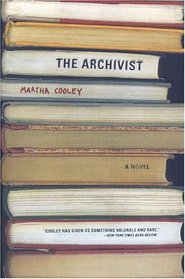Helpful Score: 2
This book was alright, but I grew bored at Part 2 of the book detailing Matt's wife's letters or journal entries. The book's premise reminded me a lot of and was similar to A.S. Byatt's Possession, minus the panache and symbolism involved. I gave up midway through the book because I simply was no longer interested in the plot, especially since I found it highly predictable.
Best of luck to the next reader!
Best of luck to the next reader!
Helpful Score: 2
A lovely look at the life of a somewhat isolated librarian, his love of his work, and the relationship that upsets his views of how things work. Somewhat reminiscent of "Possession" by A. S. Byatt.
Helpful Score: 2
This would be an ideal read for a T.S.Eliot fan, or perhaps someone with a deep understanding of TS Eliot, fan or not. It is tightly written, a tad too esoteric for my tastes. It revolves around Matt, the archivist, his wife Judith and later Roberta, a TS Eliot scholar. It is set during and after WWII and relates to holocaust atrocities.I believe it was a first novel and as such it takes a huge bite into how guilt and passion affect the life of an otherwise compulsively ordered man.
Helpful Score: 1
This is very good read and lets you into a very small, but interesting academic world.
Helpful Score: 1
This was a really intersting story that crossed over topics like survivor's guilt after WWII, marriage/relationships, depression, attraction, and library stewardship. Enjoyable but with some very heavy moments.
The reserved voice of 65-year-old Matthias Lane, archivist at a prestigious Eastern university, opens this remarkably assured first novel, a complex and beautifully written tale of loss, crises of faith and resolution. Then we read the anguished journal of his wife, Judith, a poet who committed suicide in a mental institution in 1965, the same year as T.S. Eliot died. This is just one of the many parallels between the life of the poet and those of Matt and Judith (Eliot, of course, committed his own wife, Vivienne, to an asylum). Grad student and poet Roberta Spire requests Matt's permission to look at the sealed correspondence between Eliot and a Boston woman named Emily Hale, to whom he may have bared his emotions. Roberta has more than an academic interest in this correspondence. She is immensely disturbed by her parents' belated revelation that they were Jews who fled Germany and converted to Christianity in the U.S., and she feels that Eliot's conversion to Catholicism may hold insights for her. She is unaware that Judith's mental breakdown was related to the Holocaust, but Matt is quick to see the relationship and to recognize the parallels between Eliot's reclusive personality and his own emotional detachment. As several wrenching surprises about the past are revealed, Matt is finally opened to his pain and guilt and to an affirmative act of connectedness and trust. With its sinewy interplay of moral, spiritual and philosophical issues, its graceful interjection of lines of poetry and references to jazz, the novel first engages the reader's intellect. Soon, however, the emotions are also engaged, and the narrative acquires unflagging suspense as it peels back layers of secrets. This is an auspicious debut from a writer who already has mastered the craft.
I would say an enjoyable and challenging read, nothing earth-shattering.




